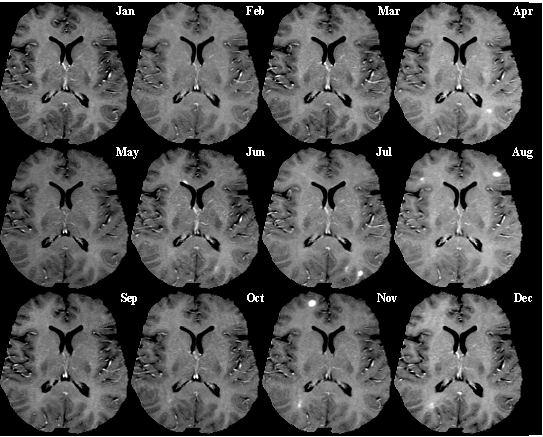What is it like to have MS?
Interview with
Our main topic this week is Multiple sclerosis, a debilitating disease which affects more  than two million people worldwide. It commonly strikes otherwise healthy individuals in their 20s and 30s, and the symptoms can include loss of sensation and difficulty moving; many sufferers become wheelchair-bound.
than two million people worldwide. It commonly strikes otherwise healthy individuals in their 20s and 30s, and the symptoms can include loss of sensation and difficulty moving; many sufferers become wheelchair-bound.
To find out what it's like to have MS, Hannah Critchlow went to see someone who was diagnosed with the disease 10 years ago...
Anthony - I'm Anthony Dean. I was diagnosed with MS in 2003 after a year of symptoms that were kind of similar and kind of strange, and I didn't really know what they were.
I went to see my GP after having pins and needles in two fingers in my right hand which went away after about a month. Three months later, I had pins and needles down my left arm, and then about 6 months after that, I lost sensation in the right-hand side of my body from the neck down. So, I had no sense of touch. I found it difficult to hold things, to use a knife and fork, work, typing was difficult and that's when I went to the GP who then referred me on to Addenbrookes Hospital (in Cambridge) to be checked over for MS.
Hannah - And that must've been quite terrifying to have experienced this almost paralysis. What happened once you were at Addenbrookes Hospital?
Anthony - I went through a series of tests first - checked my vision, checked my balance, checked my memory, and sensation, touch. Then after that, went back for a lumbar puncture and then after the results of the lumbar puncture, that's when I got my diagnosis.
Hannah - And how long did it take until your final diagnosis?
Anthony - From my first symptom, which would've been in 2002, I was diagnosed in July 2003. So, it wass just about a year from the first time it happened. But the first time it happened, I never told anyone because to me, it was just numbness in my fingers. I slept funny. I might have trapped a nerve, was what I told myself. When it happened the second time, I thought I'd trapped a nerve the second time. When it happened the third time, I thought, this is probably connected and now, it's probably time to go and see someone.
Hannah - And at this point, how was it affecting your life whilst you're waiting for the diagnosis?
Anthony - I was working at the time. It was more of an inconvenience. There was nothing that was stopping me from actually doing anything. At work, I ended up working one-handed. So, I could use my left hand but my right hand really couldn't control a mouse. I ended up typing with one finger on my right hand compared to using the whole of my left hand. And driving a car was not impossible, but there would've been times where looking back now, perhaps I shouldn't have done it because I may not have felt that I had full control over the accelerator pedal. But it wasn't too bad. I was lucky in that sense that I could continue doing everything that I normally did. Perhaps I wasn't playing golf as I used to or playing snooker. But yeah, everything else, I could just about do.
Hannah - And how did you feel after you were diagnosed with MS, all the way back in 2003?
Anthony - At first, to hear a diagnosis like MS, it's a little bit startling. My only experience of MS or anyone with MS had actually been from the TV programme, The West Wing. In the first series of it, it's revealed as the American president has lied to the American public by saying he's had MS and he's been treated. In it, there's lots of question over it, is he capable to still be president? What happens if he has a relapse? It's something which they actually spell out very clearly in the programme, that it's not a condition that will kill you. It's not something that is - it will affect you in certain ways, but it's not a life threatening illness. So in it he basically continues to be president for another 7 years after that point. So, I felt very comfortable on the back of that.










Comments
Add a comment